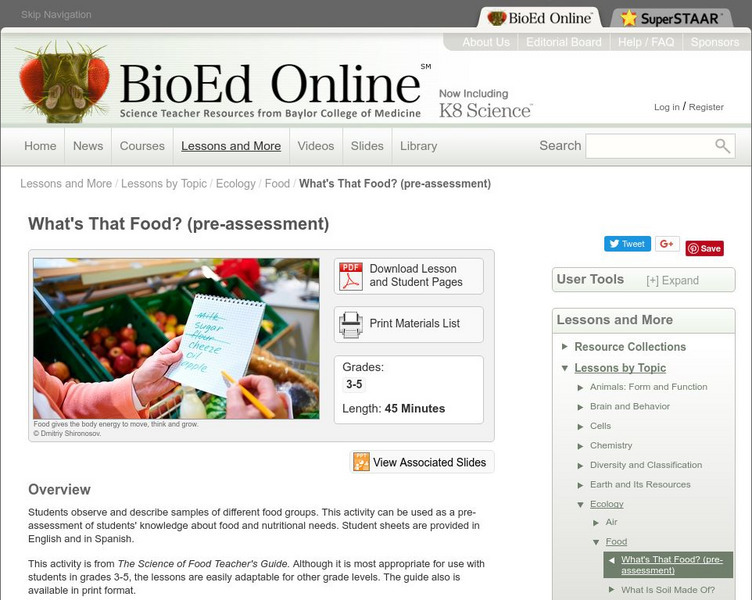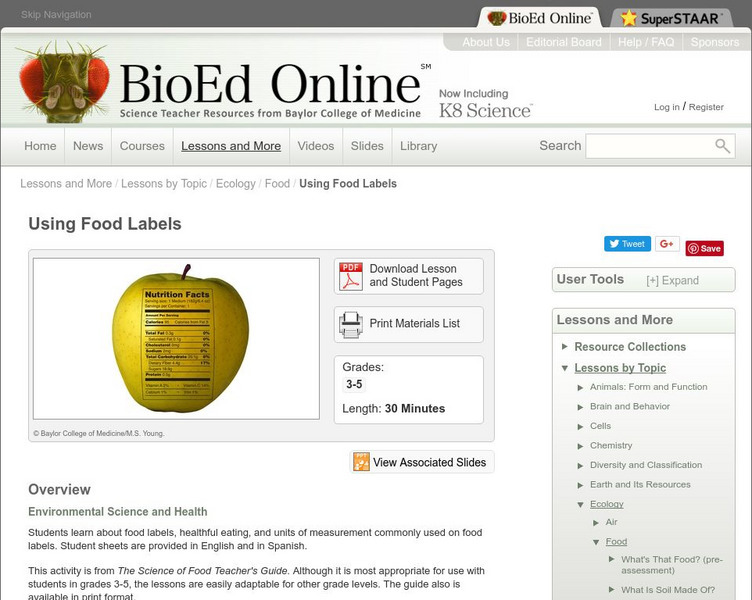Hi, what do you want to do?
Other
Pbs Ready to Learn: Abcd Eat Right! [Pdf]
Workshop lesson plan to help children understand the importance of healthy eating. Geared to both teachers and parents, this plan provides activities, book titles that are relevant, and charts and pictures to print out.
BioEd Online
Bio Ed Online: What's That Food? (Pre Assessment)
This activity explores healthy eating and can be used as a pre-assessment of students' knowledge about food and nutritional needs. Students will observe and describe samples of different food groups then share their observations with the...
PBS
Pbs Teachers: American Masters: Alice Waters: You Are What You Eat
Examine eating habits and determine how one can eat food that is healthier and tastier. Develop a proposal and multimedia presentation about improving the quality of food in the school.
PBS
Pbs Learning Media: Lesson 10: Eat Food. Not Too Much. Mostly Plants.
In this final lesson a clip from In Defense of Food shows learners the vibrant food movement that is springing up across the country. In a final celebration, students share their final projects with the class and think about how they can...
Alabama Learning Exchange
Alex: What's on Your Plate?
In today's fast food world, it can be hard to make healthy eating choices. In this lesson plan, students will learn how they can incorporate healthy eating habits in their daily routines. They will use menus from local restaurant chains...
PBS
Pbs Teachers: Fat: Obesity, Eating Habits and Weight Loss
Evaluate current guidelines for a healthy diet, compare them to one's own eating habits and learn safe behaviors for maintaining a healthy weight. Analyze the food pyramid, fast-food and health-food nutrition and the causes of obesity.
BioEd Online
Bio Ed Online: Using Food Labels
Do you know how to read a food label? Food labels provide important information about the nutritional value of foods. In this lesson students will learn about food labels, healthful eating, nutrition facts, and units of measurement...
PBS
Pbs Learning Media: Lesson 1: Where Are the Soda Trees?
Using film clips from In Defense of Food and a team activity, students explore healthy eating habits. Students get excited about becoming food defenders and begin learning how to differentiate between food (whole and minimally processed)...
PBS
Pbs Learning Media: Lesson 9: Lettuce Turnip the Beet
In this lesson learners explore plant-based foods enjoyed by their own and other families and cultures and how to face challenges to healthy eating.
PBS
Pbs Kids Afterschool Adventure!: Operation: Brown Bag Activity Plan
It's time for lunch! In this week-long adventure, children will explore numbers and counting in the context of healthy eating. They will learn about the five food groups and create a healthy lunch using foods from each food group. Each...
Alabama Learning Exchange
Alex: You Are What You Eat
Girls and boys explore the connections between a well-balanced diet and a healthy body. Students keep a food diary, then compare their diet to the recommended daily allowance of food servings. Students use Thinkfinity websites to examine...
Alabama Learning Exchange
Alex: Eat, Drink, and Be Healthy
For this lesson, students evaluate their eating habits, focusing on the ways in which one can assess whether or not his or her diet is nutritious. Students will work in small groups to design a menu for a healthy lunch and write a...
PBS
Pbs: Scientific American Frontiers: Teaching Gude: Healthy Choices
Through this activity, high school learners keep track of what they eat everyday and compare their nutrient intake with the minimum requirements for good health.
National Institutes of Health
Nih Curriculum Supplement Series: The Science of Energy Balance
A great resource for teachers to help explain the balance between calorie intake and physical activity. There are many student activities that reinforce the need for physical activity in a healthy life style. Included are a teacher's...
HotChalk
Hot Chalk: Lesson Plans Page: Healthy Food Choices
This lesson plan is designed to teach young children about healthy food choices by collecting eight healthy food selections from magazine clippings.
PBS
Pbs Learning Media: Lesson 8: Color Your World
For this lesson, students play a guessing game to explore different fruits and vegetables, emphasizing the diversity of colorful foods available for them to eat. Students prepare and eat a colorful, plant-based salad and brainstorm ways...
PBS
Pbs Learning Media: Lesson 5: Supersized
In this lesson, students examine portion sizes and how our eyes, as well as food companies, may deceive us in estimating a healthy amount to eat. Through popcorn experiments, along with a clip from In Defense of Food, students learn how...
PBS
Pbs Learning Media: Lesson 3: Claim Game
Using a clip from In Defense of Food and photos of food packaging, students uncover five "tricky techniques" companies use to sell food products. Then, students create plans to eat foods instead of phuds to avoid the allure of clever...
PBS
Pbs Learning Media: Lesson 2: Chemical Cuisine
By exploring the ingredients in various foods and phuds, learners experience first-hand how phuds are engineered to taste irresistible. Students learn and discuss a new Food Rule around eating foods with easily pronounceable ingredients.
PBS
Pbs Learning Media: Lesson 7: Rooting for Plants
This is the first lesson in the "Mostly Plants" section. Middle schoolers are introduced to the amazing variety of plant-based foods and relate that to MyPlate, our national dietary guidance. Watching a clip from In Defense of Food and...
PBS
Pbs Teachers: Scientific American: Superhumans and Bionics: A Heart of Titanium
Explore how to keep your heart healthy by exercising regularly, sticking to a low-fat diet and not smoking. Use mathematics to understand nutritional information about various foods.
PBS
Pbs Teachers: Smarter Food Processing Techniques
Test your knowledge about the foods you eat by taking a short quiz. Match products to their ingredients, answer questions about nutritional values and compute the amount of fruits and vegetables consumed per year.





![Pbs Ready to Learn: Abcd Eat Right! [Pdf] Lesson Plan Pbs Ready to Learn: Abcd Eat Right! [Pdf] Lesson Plan](https://static.lp.lexp.cloud/images/attachment_defaults/resource/large/FPO-knovation.png)









